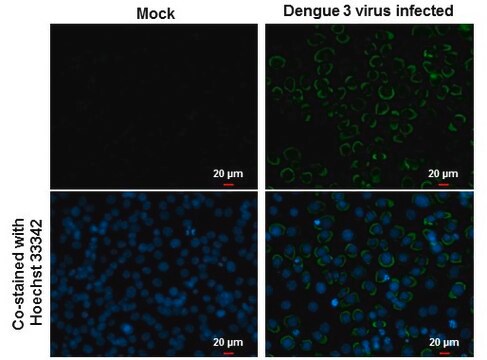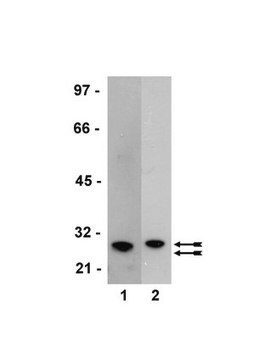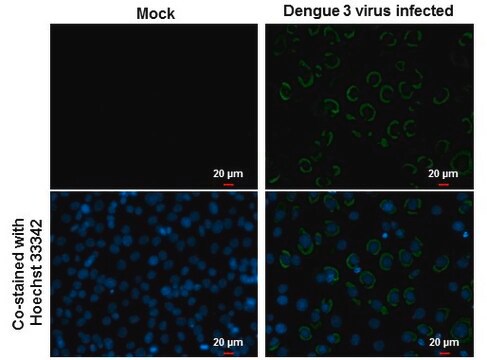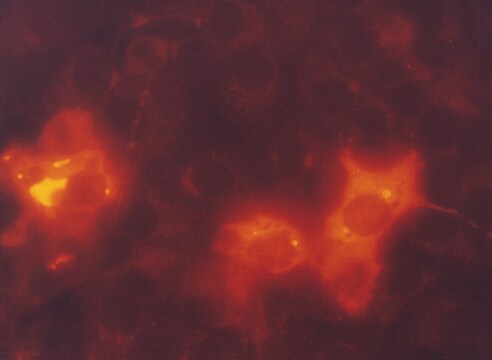MAB8703
Anti-Dengue Virus Type III Antibody, clone 5D4-11
clone 5D4-11, Chemicon®, from mouse
Se connecterpour consulter vos tarifs contractuels et ceux de votre entreprise/organisme
About This Item
Code UNSPSC :
12352203
eCl@ss :
32160702
Nomenclature NACRES :
NA.41
Produits recommandés
Source biologique
mouse
Niveau de qualité
Forme d'anticorps
purified antibody
Clone
5D4-11, monoclonal
Espèces réactives
human
Fabricant/nom de marque
Chemicon®
Technique(s)
immunofluorescence: suitable
Isotype
IgG1
Conditions d'expédition
wet ice
Description générale
Dengue fever is an acute, mosquito-transmitted viral disease characterized by fever, headache, arthralgia (severe retro-orbital pain), myalgia, rash, nausea, and vomiting. Infections are caused by any of the four closely related, but antigenically distinct virus serotypes (DEN-1, DEN-2, DEN-3, and DEN-4). Infection with one of these serotypes does not provide cross-protective immunity, so persons living in a dengue-endemic area can have four dengue infections during their lifetimes. Dengue is primarily an urban disease of the tropics, and the viruses that cause it are maintained in a cycle that involves humans and Aedes aegypti, a domestic, day-biting mosquito that prefers to feed on humans. Although most dengue infections result in relatively mild illness, some can produce Dengue Hemorrhagic Fever (DHF) or dengue shock syndrome, with children being particularly at risk. Although epidemic outbreaks have been reported since 1779, the incidence has been increasing, with global, multiple serotype pandemics intensifying within the last 15 years. There is no specific antiviral therapy for dengue, but for both classical dengue and dengue hemorrhagic fever, symptomatic and supportive measures are effective. Important risk factors for DHF include the strain and serotype of the virus involved, as well as the age, immune status, and genetic predisposition of the patient.
Spécificité
Reacts with the Dengue type 3 virus.
Immunogène
Dengue virus antigens (H87).
Application
Anti-Dengue Virus Type III Antibody, clone 5D4-11 is an antibody against Dengue Virus Type III for use in IF.
Immunofluorescent assay.
Final working dilutions must be determined by end user.
Final working dilutions must be determined by end user.
Research Category
Infectious Diseases
Infectious Diseases
Research Sub Category
Infectious Diseases - Viral
Infectious Diseases - Viral
Forme physique
Format: Purified
Purified. 0.02M Phosphate Buffer, pH 7.6, 0.25M NaCl and 0.1% sodium azide.
Stockage et stabilité
Maintain at 2-8°C in undiluted aliquots for up to 12 months. Avoid repeated freeze/thaw cycles.
Autres remarques
Concentration: Please refer to the Certificate of Analysis for the lot-specific concentration.
Informations légales
CHEMICON is a registered trademark of Merck KGaA, Darmstadt, Germany
Clause de non-responsabilité
Unless otherwise stated in our catalog or other company documentation accompanying the product(s), our products are intended for research use only and are not to be used for any other purpose, which includes but is not limited to, unauthorized commercial uses, in vitro diagnostic uses, ex vivo or in vivo therapeutic uses or any type of consumption or application to humans or animals.
Code de la classe de stockage
10 - Combustible liquids
Classe de danger pour l'eau (WGK)
WGK 2
Point d'éclair (°F)
Not applicable
Point d'éclair (°C)
Not applicable
Certificats d'analyse (COA)
Recherchez un Certificats d'analyse (COA) en saisissant le numéro de lot du produit. Les numéros de lot figurent sur l'étiquette du produit après les mots "Lot" ou "Batch".
Déjà en possession de ce produit ?
Retrouvez la documentation relative aux produits que vous avez récemment achetés dans la Bibliothèque de documents.
Evaluation by flow cytometry of antibody-dependent enhancement (ADE) of dengue infection by sera from Thai children immunized with a live-attenuated tetravalent dengue vaccine.
Bruno Guy, Pornthep Chanthavanich, Sophie Gimenez, Chukiat Sirivichayakul et al.
Vaccine null
Identification of distinct antigenic determinants on dengue-2 virus using monoclonal antibodies.
Gentry, M K, et al.
The American Journal of Tropical Medicine and Hygiene, 31, 548-555 (1982)
Dengue virus-specific and flavivirus group determinants identified with monoclonal antibodies by indirect immunofluorescence
Henchal, E A, et al
The American Journal of Tropical Medicine and Hygiene, 31, 830-836 (1982)
Notre équipe de scientifiques dispose d'une expérience dans tous les secteurs de la recherche, notamment en sciences de la vie, science des matériaux, synthèse chimique, chromatographie, analyse et dans de nombreux autres domaines..
Contacter notre Service technique



